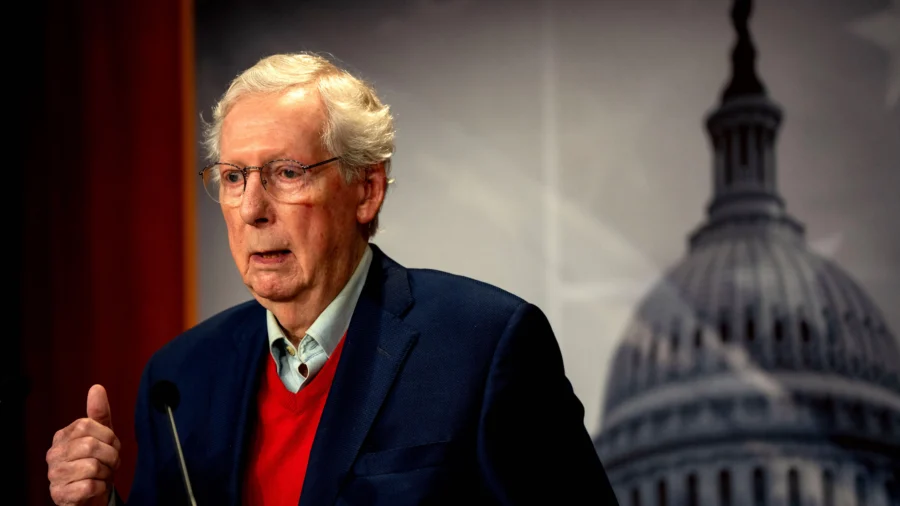Sen. Mitch McConnell (R-Ky.), the outgoing minority leader, said on Nov. 6 he believes the filibuster will remain intact after Republicans claimed a majority in the Senate and President-elect Donald Trump won the election, calling it a good day for the GOP.
Republicans seized control of the upper chamber with at least 52 seats, flipping several of them on Nov. 5.
McConnell told reporters on the morning of Nov. 6 at a news conference that the election was a “referendum on the current administration,” saying that Americans weren’t happy.
“I’ve been the majority leader, I’ve been the minority leader. Majority’s a lot better,” he told the press. A majority in the upper chamber paves the way for the GOP to push Trump’s agenda forward.
The filibuster, the tactic of unlimited debate to delay or block a vote on a measure, can only be overcome with 60 votes. Bills cannot be approved without that supermajority.
“I think this shifting to a Republican Senate majority helps control the guardrails, to keep people who want to change the rules in order to achieve something they think is worthwhile not successful. And so I think the filibuster is very secure.”
Earlier this year, McConnell announced he would be stepping down from leadership in the next term. Moving forward, he plans to focus on defense and foreign policy.
“I think this is the most dangerous time since right before World War II,” he stated.
“Our adversaries, the North Koreans, Chinese, Russians, and Iran’s proxies are all talking to each other. They have one thing in common: They hate us and they want to diminish our role in the world.”
Here are some key races that enabled the Republicans to retake control of the Senate:
Early on election night, Gov. Jim Justice won the West Virginia Senate race, flipping the seat for Republicans.
Justice will replace retiring Sen. Joe Manchin (I-W.Va.), who served as the state’s lone congressional Democrat for years before switching to an independent earlier this year.
The Republican easily defeated his Democratic challenger, the former mayor of Wheeling, Glenn Elliott.
The GOP victory marked the first time Republicans have won the seat since the 1950s.
Wins for Republicans continued from there, aligning with Trump across the Senate map.
Sen. Sherrod Brown (D-Ohio) lost his seat to GOP newcomer and blockchain entrepreneur Bernie Moreno.
Sen. Rick Scott (R-Fla.) held onto his seat, cruising to victory against Democratic challenger Debbie Mucarsel-Powell.
Conservative firebrand Sen. Ted Cruz (R-Texas) defended his seat against challenger Rep. Colin Allred (D-Texas) in one of the nation’s most-watched Senate races.
“Millions of Texans joined together to Keep Texas, Texas,” Cruz wrote on social media platform X after securing his victory. “I will fight to represent all 30 million Texans in the U.S. Senate and fight for jobs, freedom, and security.”
The Senate race in Nebraska boosted Republicans even more when Sen. Deb Fischer (R-Neb.) won against independent newcomer Dan Osborn.
Finally, Trump-backed Tim Sheehy defeated popular three-term Sen. Jon Tester (D-Mont.) in Montana in one of the most-watched Senate races. The tight race was called early in the morning on Nov. 6, adding to the Republicans’ newly won Senate majority.
“I’ve been serving our country since I was 18, because when your country calls, you must answer, and I am incredibly honored by your support and the trust you’ve placed in me to fight for you and serve Montana as your next U.S. Senator,” Sheehy, a former Navy SEAL, wrote in a post on X after winning the election.
Pending Senate races could expand the GOP majority even further. The GOP has a chance at a trifecta, with control of the House of Representatives still up in the air.
The Associated Press contributed to this report.
From NTD News

